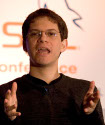Debian plans draw sharp warning from GNU guru
Jul 1, 2009 — by Eric Brown — from the LinuxDevices Archive — 2 viewsAs the Debian project releases a second update of its Debian GNU/Linux 5.0 (“Lenny”) distribution, a controversy has broken out over the next version, “Squeeze.” GNU guru Richard Stallman has warned that by including a Mono-based note-taking application called Tomboy, Debian runs the risk of Microsoft litigation over C# patents.
Debian forms the basis for a number of desktop and embedded Linux distributions, including Ubuntu and Xandros. The second stable release, made available this week, is said to include numerous security fixes, as well as "a few adjustments to serious problems." (See farther below for more on the new release.)
Meanwhile, the upcoming Squeeze release appears to have some serious problems, according to Debian insiders. The "Tomboy" issue emerged several weeks ago, according to a story in OS News. When it was revealed that the note-taking application was being incorporated as part of the next default install of Debian's GNOME environment, Microsoft-sensitive antennae started twitching, and protests appeared on blog and forum posts.
While some have argued that Tomboy, which was added to GNOME v2.18 two years ago, is an unnecessary burden in terms of its large footprint alone, the real issue is that it is written in C# and utilizes the C#-based Mono runtime and Gtk#. Mono, which shipped in a major version 2.0 release last October, is a dual-licensed cross-platform implementation of Microsoft's .NET development framework, sponsored by Novell (see farther below for more on Mono).
Now GNU founder and GPL author Richard Stallman has weighed in with a Free Software Foundation (FSF) blog, arguing that making Tomboy a default installation of Debian "leads the community in a risky direction." Continues Stallman, "It is dangerous to depend on C#, so we need to discourage its use."
Will Tomboy get the TomTom treatment?
The problem is not with Tomboy or C# per se, writes Stallman, but rather with the threat that Microsoft may one day call in its claimed C# patents, and "force all free C# implementations underground." With Microsoft's recent victory in pressuring TomTom to settle with the company after being sued over its FAT-related patents, Stallman's concerns deserve serious consideration.
Stallman notes that he is not arguing that "implementing C# is a bad thing," and he applauds free C# implementations for letting users run C# programs on open source platforms. The problem, he argues, derives from integrating C# code into an important open source distribution, an act that appears to be "taking a gratuitous risk."
Mono a Mono with Microsoft
Mono is a from-scratch open source implementation of Microsoft's .NET runtime and application development framework. It has proven to be controversial in the open source community, as are most Novell-sponsored efforts that appear to sidle up to Microsoft. While an impressive piece of software, and imminently useful in a .NET dominated enterprise software world, Mono is also seen by many as a potential legal landmine, due to Microsoft patents.
 Miguel de Icaza (Click for details) |
Novell acquired Mono with its 2003 purchase of Ximian, a start-up co-founded by Mono project instigator Miguel de Icaza (pictured). The technology has become an increasingly important part of the Linux desktop, underpinning the f-spot photo manager, Banshee music player, and Beagle desktop search utility. It has also seen use in commercial software projects, and even in web applications such as those powering social networking site iMeem and the Second Life online virtual worlds project.
Mono 2.0 now supports Linux, Solaris, Unix, Mac OS X, and BSD, says the Mono project. The Mono 2.0 compiler is said to be fully compatible with Microsoft .NET 2.0, and also mimics portions of later versions. (An interview with Miguel de Icaza held when Mono 2.0 was released may be found here.)
Lenny gets a security update
The Debian project notes that the second update release to version 5.0 "does not constitute a new version" of Debian, and that "there is no need to throw away 5.0 CDs or DVDs." Users can update their current version via an up-to-date Debian mirror after an installation, and new CD and DVD images containing updated packages are expected to be available soon, says the project.
The much delayed Debian 5.0 appeared in its first final release in February. The "Lenny" release supports 12 processor architectures, a choice of four desktop environments, and broad standards compliance. Among many other new features, it adds a "goplay" GUI app that is designed to help users discover games and other open source applications.
For embedded developers, one important feature is the arrival of a stable armel branch, which adds support for the floating point hardware found in modern ARM cores. Lenny also adds "emdebian" tools aimed at helping developers shrink source packages, and cross compile them for various architectures.
Availability
The second stable update to Debian 5.0 may be found at the mirror sites linked to here. More information on the security updates and fixes in the release may be found here.
Richard Stallman's FSF blog on Tomboy may be found here. The June 12th post on Tomboy in OS News, offering links to various blogs on the subject, may be found here.
This article was originally published on LinuxDevices.com and has been donated to the open source community by QuinStreet Inc. Please visit LinuxToday.com for up-to-date news and articles about Linux and open source.